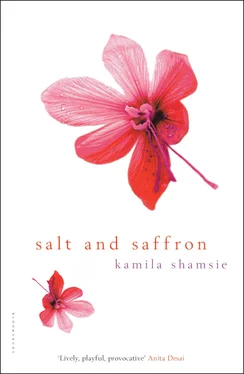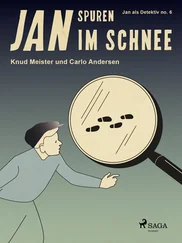‘Aliya, I’m not going to shake your hand. No way. No civilized goodbyes, or sorry-our-timing-was-bad speeches, okay?’
‘What then, Khaleel?’
Samia was watching television when I walked into the flat, minutes later, but she turned it off when she saw me. ‘Where have you … What’s wrong? You look mighty odd.’ She walked closer to me. ‘Are you drunk?’ She leant in, smelt my breath. ‘Is that cider?’
That I hadn’t told him what time I’d be leaving in the morning did not prevent me from looking for him as I exited Palmer House and moved towards the waiting cab. Samia, her tongue thick with sleep, told me not to be a fool, and no, I didn’t have a few more minutes before I had to leave and, please, did I really expect her to believe I wanted those extra minutes because I hated saying goodbye to her.
‘Well, I do,’ I said.
‘Are you getting misty-eyed?’ She blinked and stared at me. ‘You are! My God, Aliya, I haven’t made you cry since that time you had mumps and I told you the only cure was surrounding yourself with dirty undergarments. What did I say MUMPS stood for? Malodorous Underwear Might Provide Succour.’
It’s a family tradition. When you leave, you leave laughing.
But airports and aeroplanes kill all laughter. Things I find funny anywhere else seem like signs of the coming Apocalypse in an airport. This time was no different. While I was still queuing up to get my boarding pass an airline official walked past, checking that everyone had passports and tickets ready, and told me my suitcase was ‘not appropriately proportioned’. Was it too large? Too wide? Too high? He sniffed and conceded, no. And walked on. At the ticket counter I was told that the computer ‘doesn’t seem to want to recognize you’. ‘Well, force it,’ I said. The man behind me whispered, ‘Farah’ and started humming the Charlie’s Angels theme. It’s what every airport experience needs: a touch of seventies magic. But at least the airline person took me seriously and thumped on the computer until it yielded up my name. In return for this affront, the computer gave me a seat in the smoking section.
Aboard the flight, I waited patiently for take-off and the subsequent extinguishing of the no-smoking sign, at which point a small group of men — blatantly ignoring the earlier breathy instructions of the flight attendant — got up from their seats in the no-smoking section and walked back to light up, scant feet from my face.
‘Excuse me,’ I said. ‘Would someone mind swapping seats with me? I don’t want to be in the smoking section.’
‘Who does?’ said a man with beautifully manicured hands, puffing away at his Marlboro.
But by now I had spotted my targets. There were three Pakistanis grouped together, labourers by the look of it, and for their benefit I repeated the question in Urdu.
‘Give the lady your seat,’ one said, gesturing at a wiry, bearded man.
‘Yes. Do you want her to travel in discomfort all the way to Karachi?’ another said. ‘Didn’t anyone ever teach you any manners?’
The wiry man turned to me. ‘Our seats are 8D, E and F. Go and sit in any one. We’ll decide who should stay here.’
I took the aisle seat. Sat down and closed my eyes, pretending to be asleep by the time two of them came back, having left the wiry man amidst the swirl of smoke.
The man in the seat next to me said to his companion, ‘Why is it that the desire for a cigarette is even stronger on a flight during take-off than it is just before Iftari, even when Ramzan falls in summer and you’re without a smoke for over fourteen hours?’
There are only two things I can do to while away time on a plane: talk, or remember.
I remembered Ramzan.
Officially the month of fasting, Ramzan has always seemed to me synonymous with feasting. Through the first eighteen years of my life, abstaining from food and drink from sunrise to sunset had less to do with religious devotion than it did with culinary devotion. For in order to truly appreciate the Iftari meal that Mariam Apa ordered — yes, since her arrival she had been the one responsible for ordering meals and everyone swears that, though Masood had been a fine cook to begin with, he only became a magician when she started telling him what to cook. (I might be inclined to view this comment with suspicion if it wasn’t for the fact that I’ve seen people attempting to replicate Masood’s recipes in their kitchens, even going to the extent of borrowing his pots and pans and chopping board and knife, but never, not once, has anyone succeeded in producing a meal that could be mistaken as Masoodian. ‘Haath mein maza hai,’ Dadi always said — the delight is in his hand — but perhaps the delight was really in Mariam’s voice.) Regardless of cause and effect, what I was saying was that to appreciate the Mariam — Masood Iftaris we had to build ourselves up to a pitch of hunger that enabled us to sit and eat and eat for an hour and a half without pause.
In drawing rooms across the country frazzled Begums complained that all this fasting, combined with the heat, made their cooks so horribly bad-tempered. Of course, one felt guilty asking them to stand over a stove and cook under these circumstances. Masood, however, loved it. He liked nothing so much as to shoo us out of the kitchen with the warning, ‘If you smell my food you will be so overcome with temptation that you’ll break your fast on the spot. Leave, leave, before you make me into an instrument of Shaitan and I send you to hell.’ The only person he allowed in was Mariam Apa, who would chop and stir and watch, as she never did during any other time of the year.
And oh! the meals that resulted. We started with the requisite date, of course, to symbolize fidelity to the first Muslims in the deserts of Arabia, but then … on to gluttony! Curly shaped jalaibees, hot and gooey, that trickled thick sweet syrup down your chin when you bit into them; diced potatoes drowned in yogurt, sprinkled in spices; triangles of fried sarnosas, the smaller ones filled with mince-meat, the larger ones filled with potatoes and green chillies; shami kebabs with sweet-sour imli sauce; spinach leaves fried in chick-pea batter; nihari with large gobs of marrow floating in the thick gravy, and meat so tender it dissolved instantly in your mouth; lassi that quenched a day-long thirst as nothing else did and left us wondering why we ever drank Coke when a combination of milk, yogurt and sugar could be this satisfying; an assortment of sweetmeats — gulab jamoons, ladoos, burfi.
There were always at least ten people gathered at our house by sunset for Iftari and, at some point, someone would look up from his or her third helping and say, ‘Mariam, have you finished eating? That’s an insult to the food. It’s divine!’ And Mariam Apa, who always ate just enough to show she appreciated the food, would make a gesture as though plucking the words from the air and swallowing them, to indicate, ‘I am eating your praise.’ Then she would look across at Masood, who had walked in with hot naans to go with the nihari, and smile her smile of congratulations. Masood would incline his head in a gesture that was not so much a salaam of deference as an acceptance of well-deserved praise.
(When I start to talk about Masood’s cooking to people who’ve never tasted it, I’m often greeted with looks of scepticism. All I’ll say is this: the Dard-e-Dil relatives of Dadi’s generation swear the finest meals they’ve eaten have all come from Masood’s kitchen. Such a compliment is not to be slighted when it comes from people who’ve eaten food from the fabled kitchens of the Dard-e-Dil palace where legions of cooks plied their trade, each one specializing in a different kind of food. So, for instance, there was one cook for the rice dishes and one for the parathas, one for the sweetmeats and one for the kebabs.)
Читать дальше












